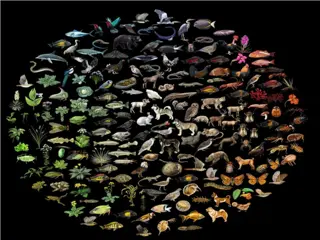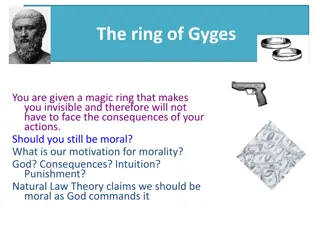Exploring Affect Theory in Modern Society
Affect theory delves into the complexities of emotions and their expression in contemporary society, shedding light on the impacts of modern life on individuals. Through a lens of nonlinguistic forces, it examines the dynamics of power, culture, and social interactions, offering insights into the nuances of human experiences and relationships. This theory challenges traditional perspectives on emotions and invites a deeper understanding of the affective dimensions of our lives.
Download Presentation

Please find below an Image/Link to download the presentation.
The content on the website is provided AS IS for your information and personal use only. It may not be sold, licensed, or shared on other websites without obtaining consent from the author. Download presentation by click this link. If you encounter any issues during the download, it is possible that the publisher has removed the file from their server.
E N D
Presentation Transcript
US What we feel
Our society: the forms of emotion deemed acceptable as expressions of our feelings, the feelings expressible in a particular moment US (affects) What we feel
In Berlant and Stewarts hands, affect theory provides a way of understanding the sensations and resignations of the present, the normalized exhaustion that comes with life in the new economy. It is a way of framing uniquely modern questions: Where did the seeming surplus of emotionality that we see on the Internet come from, and what might it become? What new political feelings were being produced by the rudderless drift of life in the gig economy? What if millennials were unintelligible to their parents simply because they have resigned themselves to precariousness as life s defining feature? Hsu, Hua. 2019. Affect Theory and the New Age of Anxiety. The New Yorker. 2019. https://www.newyorker.com/magazine/2 019/03/25/affect-theory-and-the-new- age-of-anxiety.
Affect theory is an approach to culture, history, sociality, and power that focuses on nonlinguistic forces, or affects. Affects make us what we are, but they are neither under our conscious control nor even necessarily within our awareness and they can only sometimes be captured in language. Affect theory helps us understand power by encouraging us to think of power as theater. Donovan, Schaefer. 2019. What Is Affect Theory? -. Donovan Schaefer, University of Pennsylvania. 2019. http://donovanschaefer.com/what-is- affect-theory/.
With this inspiriting notion, her questions increased in number and meaning; and she particularly led Harriet to talk more of Mr. Martin, and there was evidently no dislike to it. Harriet was very ready to speak of the share he had had in their moonlight walks and merry evening games; and dwelt a good deal upon his being so very good-humoured and obliging. He had gone three miles round one day in order to bring her some walnuts, because she had said how fond she was of them, and in every thing else he was so very obliging. He had his shepherd s son into the parlour one night on purpose to sing to her. She was very fond of singing. He could sing a little himself. She believed he was very clever, and understood every thing. He had a very fine flock, and, while she was with them, he had been bid more for his wool than any body in the country. She believed every body spoke well of him. His mother and sisters were very fond of him. Mrs. Martin had told her one day (and there was a blush as she said it,) that it was impossible for any body to be a better son, and therefore she was sure, whenever he married, he would make a good husband. Not that she wanted him to marry. She was in no hurry at all.
Mr. Elton was only too happy. Harriet listened, and Emma drew in peace. She must allow him to be still frequently coming to look; any thing less would certainly have been too little in a lover; and he was ready at the smallest intermission of the pencil, to jump up and see the progress, and be charmed. There was no being displeased with such an encourager, for his admiration made him discern a likeness almost before it was possible. She could not respect his eye, but his love and his complaisance were unexceptionable. The sitting was altogether very satisfactory; she was quite enough pleased with the first day s sketch to wish to go on. There was no want of likeness, she had been fortunate in the attitude, and as she meant to throw in a little improvement to the figure, to give a little more height, and considerably more elegance, she had great confidence of its being in every way a pretty drawing at last, and of its filling its destined place with credit to them both a standing memorial of the beauty of one, the skill of the other, and the friendship of both; with as many other agreeable associations as Mr. Elton s very promising attachment was likely to add.
You had better explore to Donwell, replied Mr. Knightley. That may be done without horses. Come, and eat my strawberries. They are ripening fast. If Mr. Knightley did not begin seriously, he was obliged to proceed so, for his proposal was caught at with delight; and the Oh! I should like it of all things, was not plainer in words than manner. Donwell was famous for its strawberry-beds, which seemed a plea for the invitation: but no plea was necessary; cabbage-beds would have been enough to tempt the lady, who only wanted to be going somewhere. She promised him again and again to come much oftener than he doubted and was extremely gratified by such a proof of intimacy, such a distinguishing compliment as she chose to consider it. You may depend upon me, said she. I certainly will come. Name your day, and I will come. You will allow me to bring Jane Fairfax?
She felt all the honest pride and complacency which her alliance with the present and future proprietor could fairly warrant, as she viewed the respectable size and style of the building, its suitable, becoming, characteristic situation, low and sheltered its ample gardens stretching down to meadows washed by a stream, of which the Abbey, with all the old neglect of prospect, had scarcely a sight and its abundance of timber in rows and avenues, which neither fashion nor extravagance had rooted up. The house was larger than Hartfield, and totally unlike it, covering a good deal of ground, rambling and irregular, with many comfortable, and one or two handsome rooms. It was just what it ought to be, and it looked what it was and Emma felt an increasing respect for it, as the residence of a family of such true gentility, untainted in blood and understanding. Some faults of temper John Knightley had; but Isabella had connected herself unexceptionably. She had given them neither men, nor names, nor places, that could raise a blush. These were pleasant feelings, and she walked about and indulged them till it was necessary to do as the others did, and collect round the strawberry-beds. The whole party were assembled, excepting Frank Churchill, who was expected every moment from Richmond; and Mrs. Elton, in all her apparatus of happiness, her large bonnet and her basket, was very ready to lead the way in gathering, accepting, or talking strawberries, and only strawberries, could now be thought or spoken of. The best fruit in England every body s favourite always wholesome. These the finest beds and finest sorts. Delightful to gather for one s self the only way of really enjoying them. Morning decidedly the best time never tired every sort good hautboy infinitely superior no comparison the others hardly eatable hautboys very scarce Chili preferred white wood finest flavour of all price of strawberries in London abundance about Bristol Maple Grove cultivation beds when to be renewed gardeners thinking exactly different no general rule gardeners never to be put out of their way delicious fruit only too rich to be eaten much of inferior to cherries currants more refreshing only objection to gathering strawberries the stooping glaring sun tired to death could bear it no longer must go and sit in the shade.























